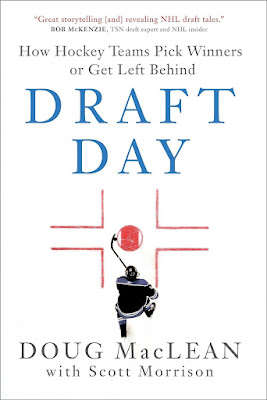By Doug MacLean with Scott Morrison
It's an age-old question. How do you build a winning team in professional sports?
Ever since the free-for-all days of signing players on your own ended at various stages (it depends on the sport, but mostly it was in the 1950s or 1960s), the draft has been the key component. That's where the biggest talent influx arrives each year. If those selections work out, one way or another, a team can add to its base of good players and start moving up the ladder in wins. In hockey, for example, teams that win Stanley Cups often have about 10 of their own draft choices on their rosters.
Some of the other picks contribute in different ways, as they are sometimes traded elsewhere to strengthen a particular spot in the lineup. If a team has some depth at defense but not much talent at center, a swap concept begins to form with a team with the opposite problem.
When watching the draft, there's always a scent that much more is going on than we know about it. Happily, veteran hockey executive Doug MacLean takes us through his career in the behind-the-scenes book, "Draft Day."
MacLean has had a variety of hockey jobs over the years. He's best known for his work as coach of the Florida Panthers and as the president and general manager of the Columbus Blue Jackets. MacLean always has come across as a smart, interesting person. Here he pulls back the curtain on what goes into the draft, which is the subject of a year's worth of work that comes down to only a couple of days of selections in the summer. No pressure, eh? There's a little wandering in the story that makes this read like an autobiography for a while, but it's not a big problem.
It's striking from the start just how close-knit the hockey family is. MacLean came out of Prince Edward Island in Canada. He played hockey there, but wasn't good enough to get a whiff of the NHL. However, he decided to work his way up the coaching ladder rather than taking what could be called "a real job." You get to meet a lot of people in the game that way, and the circles often intersect along the way. It's something of a fraternity, and friends are made for life. Those friends often turn out to be crucial in advancement.
A book like this needs to have good stories to make it work, and MacLean comes through nicely in that department during the nearly 300 pages. One of the highlights is how MacLean as the general manager at Columbus managed to trade up to acquire the first overall pick. There he scooped up Rick Nash, who proved to be a top goal-scorer in the NHL.
There's a skill to that, of course, but luck plays a hand in a team's fate as well. MacLean points out several cases where the lottery was particularly unkind to the Blue Jackets when he was there. A different ping-pong ball, or whatever is used in the lottery, would have made a big difference in the fortunes of the Columbus team. But when there are four particularly great prospects in a draft and you have the fifth pick, things aren't going to go well.
MacLean devotes a chapter to what he calls "the curious case of Nikolai Zherdev." He was a top prospect in terms of talent from Russia, but there were a few character issues floating around that were tough to decipher. MacLean and Co. put plenty of effort into due diligence when it came to finding out what the full story was. Eventually the choice came down to Zherdev or Thomas Vanek. It turned out that personal issues never allowed Zherdev to realize his talent. By the way, the Buffalo Sabres "settled" for Vanek, who turned out to be a solid pro. GM Darcy Regier told MacLean at the time that the Sabres would have taken Zherdev had they had the chance.
Speaking of the Sabres, there are a couple of little items in this book that are of interest. In 2015, MacLean tried to console Buffalo general manager Tim Murray for losing the lottery by saying that even if he couldn't get Connor McDavid, he'd at least get someone good. The reply was, "Doug, it's not even close." And back in 1991, the New York Islanders were shopping talented center Pat LaFontaine in a contract dispute. They talked to the Detroit Red Wings, and MacLean worked for the Wings at that point. He writes that the Red Wings were ready to deal Steve Yzerman to the Islanders in a package for LaFontaine. The deal eventually fell through, and LaFontaine ended up in Buffalo. If that original deal goes through with Detroit, hockey history goes in all sorts of different directions in the three cities involved.
This is all told in a down-to-earth style. Not only does MacLean comes across well, but he's in good hands in terms of assistance with Scott Morrison. The latter has been one of the most respected names in journalism for several years.
The pages on "Draft Day" may not fly by for those who aren't good-sized hockey fans or for those looking for a more indepth look at the draft process, but those that qualify (in other words, the majority of potential readers) will find this more than satisfying. They should pick it up sooner rather than later.
Four stars
Learn more about this book from Amazon.com. (As an Amazon affiliate, I earn money from qualified purchases.)
Be notified of new posts on this site via X.com @WDX2BB.

No comments:
Post a Comment